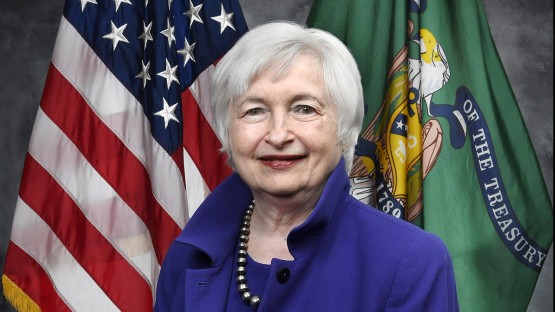Mitigating climate risks now will drive economic prosperity in the future, Treasury Secretary Janet Yellen said in her keynote speech at the virtual Cornell-OFR Conference on Global Climate Finance and Risks, held Oct. 25.
“Our global economic future depends on addressing climate change,” said Yellen, one of five keynote speakers and more than 30 experts participating in the event. “And all of those represented at this conference have a role to play: governments, international institutions, nongovernmental organizations, the private sector, universities and others.”
The conference brought together leaders in diverse fields to discuss financial strategies that mitigate both the environmental threats caused by climate change and the financial disruptions resulting from the green economy transition. The Cornell SC Johnson College of Business, the Cornell Atkinson Center for Sustainability and the U.S. Department of the Treasury’s Office of Financial Research (OFR) hosted the event, which was co-chaired by Andrew Karolyi, the Charles Field Knight Dean of the SC Johnson College; Alissa M. Kleinnijenhuis, visiting assistant professor in the SC Johnson College; and Dasol Kim, research principal at OFR. More than 750 participants from 48 countries attended.
Yellen spoke after the morning’s discussions on topics including climate science and risk, measuring corporate biodiversity footprints, reducing carbon using financial market tools and the challenges of incomplete carbon taxation. Experts from NASA, Kepos Capital, the World Bank, the Brookings Institution, the European Commission and various universities and organizations contributed to the dialogue.
“There’s no question that climate risks should be on the agenda for regulatory agencies and other actors concerned with financial stability,” Yellen said. She highlighted the Treasury’s collaboration with state regulators to improve data collection on homeowner insurance cost and availability and the move to incorporate climate change into macroeconomic models to better understand its impact on GDP, growth, employment and interest rates.
Yellen also pointed to the Inflation Reduction Act, which increases private sector incentives to invest in clean energy, and international efforts such as the Just Energy Transition Partnerships in Indonesia, South Africa and Vietnam, where the United States and others have approved roughly $3 billion in financing, with more under negotiation, to support their transitions to green energy, as examples of the government’s efforts.
“I firmly believe that mitigating climate-related risks and driving the transition to net zero can bring about a world in which our and future generations’ well-being is less under threat, our livelihoods are more secure, and our economies are more prosperous,” Yellen said.
Following Yellen’s remarks, Kleinnijenhuis’ roundtable turned to “The Economic Case for Climate Finance at Scale,” a policy brief co-authored by Kleinnijenhuis; Patrick Bolton, professor at Imperial College London; and Jeromin Zettelmeyer, director of economic policy research firm Bruegel.
“Basically, the message here is, it would make economic sense – not moral sense, but economic sense – for the advanced countries to just pay for the decarbonization of the Global South, excluding China,” Zettelmeyer said.
According to the brief, for most countries the cost of phasing out coal exceeds the economic benefits to the individual country. However, for advanced economies, the benefits exceed the costs, even for small coalitions, such as the G7 or G7 plus the European Union, and the cost would be about 0.3% of GDP annually, with 25% public contribution complementing private investment.
“Even though developed countries have been decarbonizing to some extent, last year emissions still grew,” Kleinnijenhuis said. “There is no way we are going to, as a world, get to net zero without bringing [emerging markets] on board.”
Over the past 50 years, developed countries have polluted the most, said Nuno Fernandes, professor at the IESE Business School and chairman of the European Investment Bank’s audit committee. “And now, after polluting, after creating the carbon budget, we want the cost to be spread globally?” he asked. “Well, this simply cannot work. It’s not acceptable.”
Ethan Zindler, climate counselor at the U.S. Department of the Treasury, said that cleaner, cost-competitive technologies exist, and more and more people recognize the economic opportunities presented by climate change.
“What caused these paradigm shifts?” he said. “I would argue that it’s public policies and public financing which combined to create conditions under which private investors felt comfortable deploying capital at scale.”
The afternoon continued with sessions on investing and macroprudential policies and closed with remarks by Karolyi.
“We are at a pivotal juncture in human history, with only 200 gigatons of carbon budget remaining to maintain the crucial 1.5 degrees Celsius threshold,” Kleinnijenhuis said. “We face a defining choice: Close the climate finance gap and unlock the most transformative economic opportunity of the 21st century, or embark on a path that will lead to escalating climate damages for generations to come. The moment for decisive action – at scale – is now.”
Alison Fromme is a writer for the Cornell SC Johnson College of Business.

















